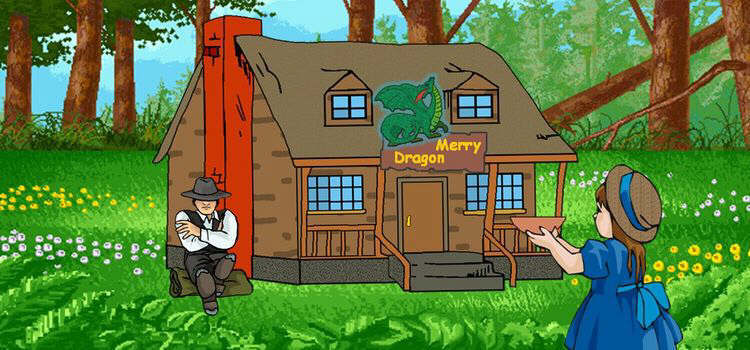
[America, around 1877] After the Civil War, more and more settlers moved to the West, throughout the prairies and the west new cities came into being, railroads and stagecoaches opened up the West.
To the prairies
In 1862, still during the war, the US government had passed the Homestead Act. For a small fee, each family was granted 160 acres land if they settled down there and farmed it for at least five years. After the Civil War, more and more settlers moved west; new towns sprang up all over the Central American prairies and west; railroads and stagecoaches opened up the West. But this land was taken away from the American Indians who were banished into reservations. The years 1862 to 1890 marked the final phase of the Indian Wars.
In 1873, the Northern Pacific Railway renamed the town Edwintown in North Dakota as Bismarck, in honor of German chancellor Otto von Bismarck. The officials hoped the new name would attract German immigrant settlers to the area, and German investment in the railroad. They knew well that Germany too was hit hard by the world economic crisis of 1875. As a result, many people over there had lost their savings, many small tradesmen and businessmen feared the social decline because they could not compete with industry products. More and more people set out to find their luck in America. Between 1865 and 1890, over 10 million people, mainly from Northern and Western Europe, immigrated to the USA.
Then gold was discovered in the nearby Black Hills of South Dakota, and thousands of miners came to the area. However, it was sacred territory to the Sioux Indians, the tensions between the Whites and the Native Americans intensified, and a new war broke out. On June 25, 1876, the 7th Cavalry under General Custer was destroyed at Little Big Horn by the Sioux.
A second visit to America
Lorenz’ and Annelie’s daughter Amber was like a little sister to Emil and Lena. When she got married, they wanted to be there. So they travelled to America again, this time with her little daughter Susan. Their entire American family had come together for the wedding.
This time, it was a happy occasion, and Lena and Emil brought good news from Germany. Sophie and Andras were diplomats now, assigned to Munich in the Kingdom of Bavaria, so not too far away. Sophie’s training and exchange program for milliners and tailors had started off well. They had two children, Lottie, and Joscha, yet they were too small to travel across the Atlantic. Count Andras’ former servant Jacob remained with Sophie’s aging parents Anni and Jean, and the three of them had hit it off right away. Finally, good times rolled.
Little Susan whooped with joy when she saw the little yellow flowers with black heads to which she owed her name. Lovingly she stroked the leaves and stuck her nose between the little flowers. More than that, for her, the “Merry Dragon” inn was an enchanted world. There was the smiling dragon above the front door which was some 150 years old now, the beautiful curtains and table cloths, Niklas’ drawings on the walls, his wine list and Jenny’s dishes on which small and big dragons cavorted. Carefully she moved her finger over the dragons and looked at them thoughtfully. “This one looks like you, Uncle Harvey,” she said.
The upright political journalist
Harvey was an elderly gentleman now. After the death of his father Niklas, he had remained on the Bergmann’s vineyard where they need every pair of hands. Not only to work in the vineyard – time and again, they had to defend themselves against war profiteers and “carpetbaggers’. Harvey, the political journalist who knew well the dark side of politics, had not hesitated to denounce these practices. And yet doing that took a lot of strength out of him.
Lena approached him. “Lorenz has sent us many of your articles, Harvey,” she said. “I admire the way you write about your country and its people who are so individual and manifold, how you want to do justice to all of them, and how you don’t let anyone misuse you for his purposes. You must not give up now. And please, continue writing the history of your town, and write about a family that sticks together across an ocean, and over generations.”
Enough plates and cups for all
One afternoon, when Harvey was alone with the children at the Merry Dragon, he wondered about the sudden silence. He got up, listened, then he heard noises coming from his mother Jenny’s former workroom. Quietly he opened the door. There were Susan and the other children, all very busy shaping plates and cups out of clay. “Now that we are so many in our family, we do not have enough plates and cups for all,” she said earnestly. Then she got back to work.
A gift to the next generation
At first, Harvey was at a loss for words, then deep joy rose in him. Before he knew it, he was the midst of the children. Now, as he grew older, he would not travel so much anymore but spend his time with his family in the Shenandoah Valley and here in the Merry Dragon Inn. Like his father, he would read a lot with the children, for example “Tom Sawyer” by Mark Twain, which had just come out.
He would also continue writing the history of their town. “Years of War” would be the third volume after the first “New Homeland Pennsylvania” and the second “Subjects and Citizens.” It would not be easy to write about all these hard years. But he would also write about a family that stuck together across an ocean, as Lena had said. That would be a gift to Susan and her generation from him – Uncle Harvey from America.

Be the first to comment